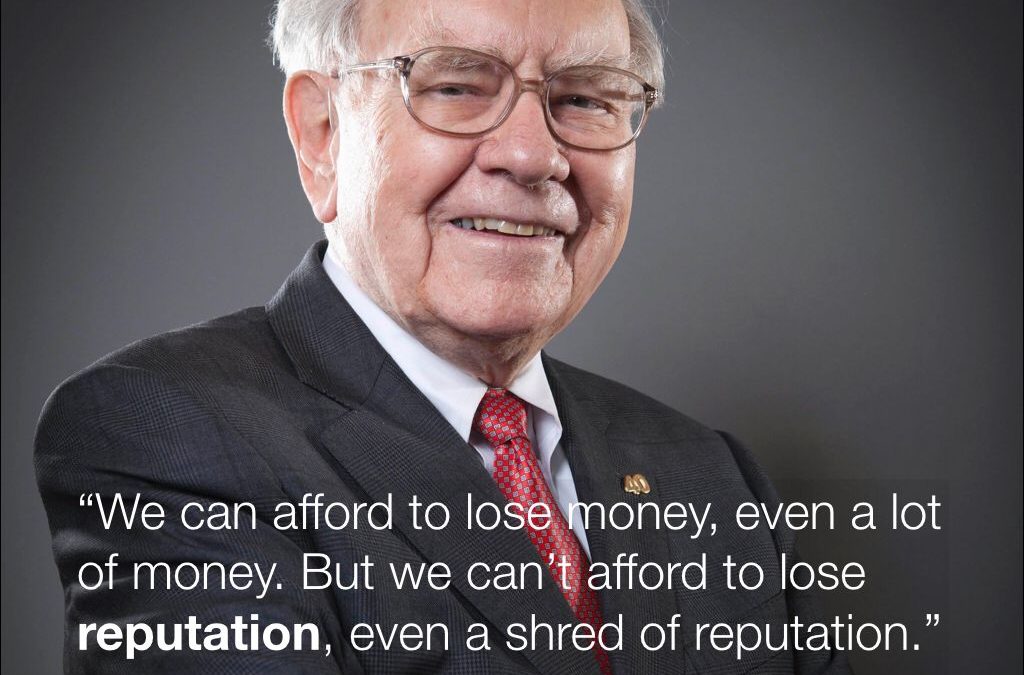[Reader Note: This article offers insights on reputation, leadership and culture, social media attacks and data breaches, and the value of employees to corporate reputations. Authored by Karl James & Company principal owner Karl Robe, it originally appeared in the WICPA magazine On Balance.]
Warren Buffet values reputation more than money. He’s often quoted as saying we can afford to lose money—even lots of money. But we can’t afford to lose reputation—even a shred of reputation. Seems counter to all held sacred by CPAs.
If you visit Baker Tily’s Governance, Risk and Compliance practice web page, however, it becomes clear CPAs stand at the epicenter of managing risk. It reads: “Managing risk is becoming more complex across all sectors—from greater transparency and accountability to increased public scrutiny and technological sophistication.”
Let’s break down Baker Tily’s statement. ‘Transparency and accountability’ signals a significant distrust toward institutions. ‘Public scrutiny and technological savvy’ implies risk posed by a 24-7 news cycle as well as the proliferation and anonymity of social media.
The greatest risk to most corporate and executive reputations, as well as agendas, is lack of preparation and attention to promoting and protecting how one is perceived by mission-critical audiences.
CPAs are in a pivotal position to be an early warning detector to prevent issues from reaching crisis level and impacting reputation. Prevention, preparation and active management are the least expensive means of maintaining reputations. This approach, however, runs counter to our run-to-failure society.
After all, everyone is busy doing what they do. A crisis of reputation seems like a low-probability, high-impact event that can be set aside for more pressing issues. In fact, the likelihood of a crisis grows greater the more connected we become. The more connected, the easier it is to impact people, profits, operations and reputation. And, once issues become crises, you can count on lost revenue, lost productivity, lost talent—until trust is restored.
Leadership & Culture
One largely untapped reputation building resource are employees. Research shows employees are your most credible sources of company information for outside stakeholders. This includes talent, which in Wisconsin, is the leading concern for most employers. Your reputation in a tight labor market will determine whether you get the best and the brightest or the dregs.
At a recent business round table discussion, one Wisconsin manufacturing company shared how it’s doing things differently. It has no trouble finding talent to fill positions. And the following approaches taken by its CEO, I would say, are reinventing how employees view this particular manufacturer and, as a result, manufacturing as a career option. The entire manufacturing sector would be wise to emulate what follows.
The CEO is transparent in what drives company success and each employee’s role in it. He hires attitude and aptitude versus education. And he pays employees based on value to the enterprise, which has led to sustainable wage levels for employee and employer. Culture is built around communication each day on clear expectations. Finally, the culture allows for failure as a means of learning and empowering.
How employees portray your company depends on culture. Culture depends on leadership. Leadership depends on trust. Reputation and trust are inextricably linked. Whatever your agenda, employees will pay a significant role.
Data Breaches
Another leading threat to corporate reputations involves cyber security. Many executives, according to a Harvard Business Review study, understand the seriousness of cyber security but “most fail to make the connection between the immediacy of these risks and the processes in place to manage them.”
Property and casualty policies are indicative of this statement. Policies offer significant investment to hire a public relations firm to respond to a cyber breach. Some policies offer $1 million to hire a public relations firm to repair reputation damage—after the fact. Some of this money would be more strategically applied to helping companies prepare ahead of a cyberattack. Preparation helps mitigate the impact and length of a reputational crisis.
Cyberattacks threaten reputation at an organizational level and leadership level with financial and career implications. Case in Point: Yahoo took a $350 million haircut in the Verizon acquisition deal and now Yahoo is under SEC investigation and its leading lawyer resigned. All appear to be in response to why it took two years to report the data breech of more than 500 million account holders.
Getting out front of a story is key to restoring trust in a case like Yahoo. Whether the story is being shared by employees at the water cooler, by social media assassins, or through data syphoned to the dark web, manage your reputation or someone else will do it for you.
Countering Social Media Attacks
Data shows reputational risk is at an all-time high. One reason is social media provides a powerful means of sharing information—whether true or not. And it lives forever. Social media and online searches are where people get their information now. More than magazines and newspapers. Which is why false information online must be addressed.
All situations are different. But we’ve had success helping clients counter online attacks by turning online complaints into opportunities to illustrate their brand and all it promises. You can visit KarlJames.com and click on ‘Countering Social Media Attacks’ to see the full case study and sample messaging used to counter this online attack of a retail client of ours.
Never let a crisis go to waste. Think how it presents an opportunity to do things differently. Doing things differently and communicating to mission-critical stakeholders will help you come out the other side of a crisis. Done right, your brand can emerge stronger than ever.
Trust Builds Reputation
Remember. Misunderstanding is the foundation of fear. Fear is the foundation of rumor. Rumor is the direct result of high-interest matters where a vacuum of information exists. All of it works against you. Words matter. Message timing matters. Delivery matters. All shape narratives. Narratives shape perception. Perception determines reputation. Reputation impacts trust. Trust determines future.
Reputation takes a lifetime to build and a nanosecond to destroy. Which, presumably, is why Warren Buffet is emphatic when he says, “Lose money for the firm, and I will be understanding. Lose a shred of reputation for the firm, and I will be ruthless.”
Corporate boards and executives should be ruthless in protecting their reputations too.

Karl Robe
Principal Agency Owner

